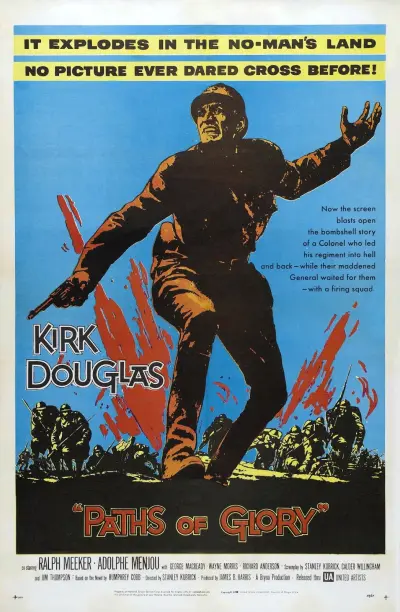
Directed by the renowned Stanley Kubrick, "Paths of Glory" is a potent antiwar film that delves into the grim realities of World War I. The story is centered around a French colonel, compellingly portrayed by Kirk Douglas, who faces off against the unforgiving and ruthless military hierarchy. The film unfolds as Colonel Dax's men are wrongfully accused of cowardice after failing to complete a mission that was essentially impossible from the start. This setup paves the way for an intense exploration of the futility and irony of war, vividly portrayed against the backdrop of the harrowing trenches of WWI.
Colonel Dax, played by Kirk Douglas, is the commanding officer of French soldiers ordered to undertake a near-suicidal attack on a German position. When his men rightfully refuse to continue the assault, they are accused of cowardice. Colonel Dax, stepping into the role of their defender in a subsequent court-martial, not only exemplifies valor and integrity but also exposes the absurdity and injustice within the military system of the time. His character becomes a symbol of resistance against the unreasonable demands and expectations of military leaders.
"Paths of Glory" is set against the backdrop of the Western Front during World War I, where German and French forces were locked in a prolonged and devastating conflict. The establishment of a continuous line of fortified trenches extending from Switzerland to the English Channel resulted in a costly and deadly stalemate, leading to immense loss of life. The film unflinchingly portrays the brutal realities of trench warfare, underscoring the senselessness and brutality of the war.
At its core, the film offers a scathing critique of the military establishment and the concept of war itself. Through the narrative of Colonel Dax and his men, Kubrick exposes the dehumanizing and often absurd nature of military bureaucracy, as well as its catastrophic impact on the lives of ordinary soldiers. The irony in the film's title, "Paths of Glory," is stark, questioning the very notion of glory in the context of the horrors and high costs of war.
The film stands out for its expert storytelling and cinematic craftsmanship. The intense drama of the courtroom scenes, combined with the realistic depiction of trench warfare, creates a compelling and emotionally charged narrative. The performances, especially that of Kirk Douglas, add depth and humanity to the story, making the characters' struggles and moral quandaries deeply relatable and poignant.
In conclusion, "Paths of Glory" remains a seminal work in the antiwar film genre, its relevance undiminished over time. Its powerful commentary on the nature of war, the injustices within military bureaucracies, and the human cost of conflict makes it an enduring piece. Through its compelling narrative, strong performances, and Kubrick's skilled direction, the film offers a profound critique of one of history's darkest periods, challenging glorified perceptions of war and celebrating the courage of those who stand against its absurdities.

